Matt Berkey: You must have had a good series because nobody sticks around for the WSOP hangover, unless you're a local.
Patrick Leonard: Yeah, I had an enjoyable series, I guess. I don't really take too much stock in the World Series. I take it seriously, but I don't have expectations or anything. So I don't come in thinking that if I don't win a bracelet, I'm going to want to leave town as soon as possible or anything. I realize I'm playing 24 tournaments or something, which is like an hour or two of online, which I normally play in a morning session.
I like Vegas. I think it's fine. I think Vegas may be underrated. It's got some nature, it's got some good food. Everything's relatively compact, at least where I live, so I can get around. I can walk even in the heat, I guess.
MB: It's an amazing hub. It's not somewhere that you want to call home. You're never going to be like, "I can't wait to go home," unless you're a degenerate who grew up here. But it's an amazing hub because if you're a poker player, there are games 24/7. You're always going to be in action. And if on top of that, you like to explore and travel, everything on the West Coast is a 90-minute flight, anything that matters that is. So for those reasons, it's an amazing hub, but it's not Vancouver, buddy.
PL: Yeah, it will never feel like home. I don't think so.
MB: I've been here 16 years.
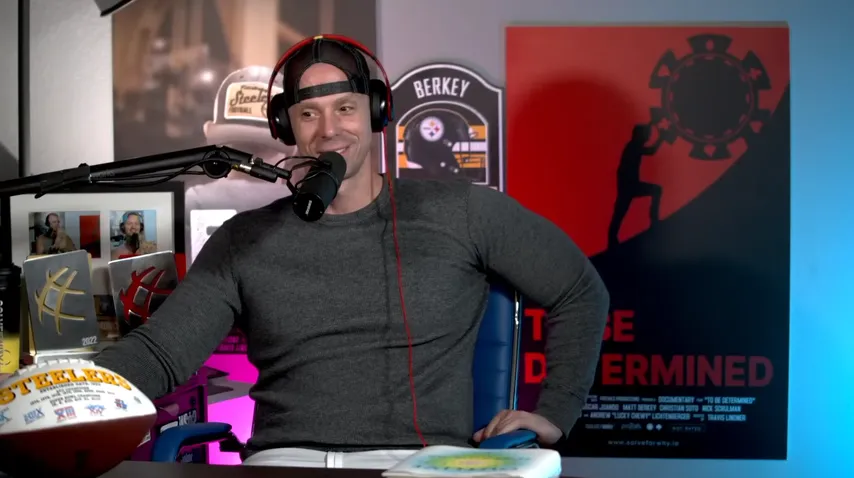
PL: Yeah, but I feel like you can wake up everyday and kind of get stuff done. You can do things if you're a poker player, you can go to the Bellagio every day and play relatively high stakes. Whereas if I'm in London, there are games running, but it's all private or whatever. I guess there are those problems here as well, I found out. But in general, there's enough action. Or if you want entertainment, shows, food, whatever, there's just a bunch going on here. I think it's okay.
MB: Yeah, so you've been grinding the mix games a little bit?
PL: Yeah, a little bit. Playing with some... it's funny because when you play against people in these mixed games, you're always playing against kind of legends. Like I was playing heads-up against Jeff Lisandro, what a beast.
So yeah, he was making me play Drawmaha heads-up against him. I've never played it. This is a split pot game. You get five cards, there's a bet-on round, then you see a flop. It's split pot. You have your five-card hand like a draw five-card draw hand, then you choose a PLO hand which plays on the flop on the board as well. Obviously, I had no clue what I was doing, and he loved it. I was playing in pretty high stakes at a game I had no clue what I was doing.
MB: So how much did you win?
PL: I think just a little bit, but yeah, it's fun playing these kinds of guys. Maybe Eli Elezra, Chino Rheem, just lots of fun. It's different, you know. After playing two months or six weeks against lots of Euros, or whatever you guys call them – headphones on, taking it very seriously – it's just a lot more laid-back, relaxed.
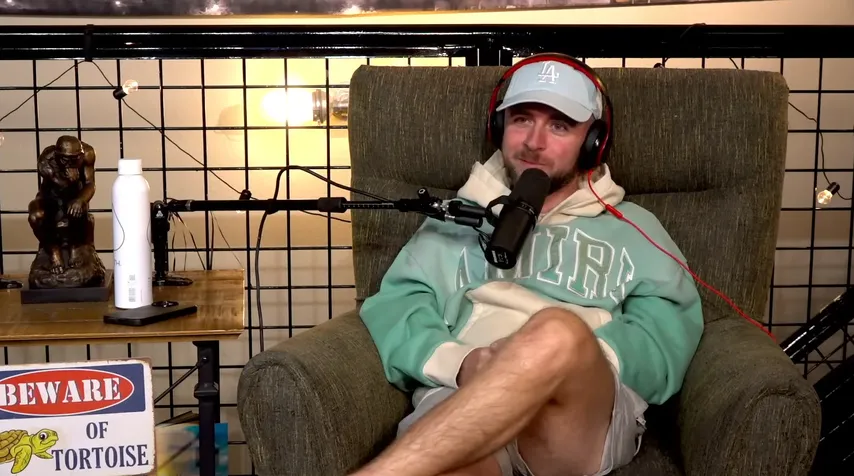
MB: We call them Svens.
PL: Yeah, a lot of Svens out there.
Real-Time Assistance in Poker (RTA)
MB: All right, let's get to some, I don't want to say grim topics, but I think a very important discussion. This has been a problem dating all the way back to COVID that has just continually ramped up.
We've seen a lot of action being taken, maybe behind the scenes, by some of these operators. Maybe not so much... it becomes a little bit unclear. You introduced me to a group of high-stakes regs that are kind of communicating behind the scenes, trying to do their best to police the community, which I think is a ridiculously invaluable resource that the poker community is very lucky to have. You guys certainly don't need to be the Batmen of the poker community, but I do think everybody in there kind of understands that it's for the greater good. If nobody's holding these operators accountable, the whole thing is just going to burn to the ground.
This current cycle of this conversation coming up, I think, was based on the latest release of GTO Wizard's postflop ICM sims, which basically takes out all the additional software you had to utilize before. Before, you'd run ICM on HRC and then convert that over into PIO where you would run an ICM postflop sim. Now you kind of have an all-in-one stop shop without a delay. This poses a very specific threat to online poker, I think, depending upon how vigilant operators are at policing these third-party softwares from running in the background.
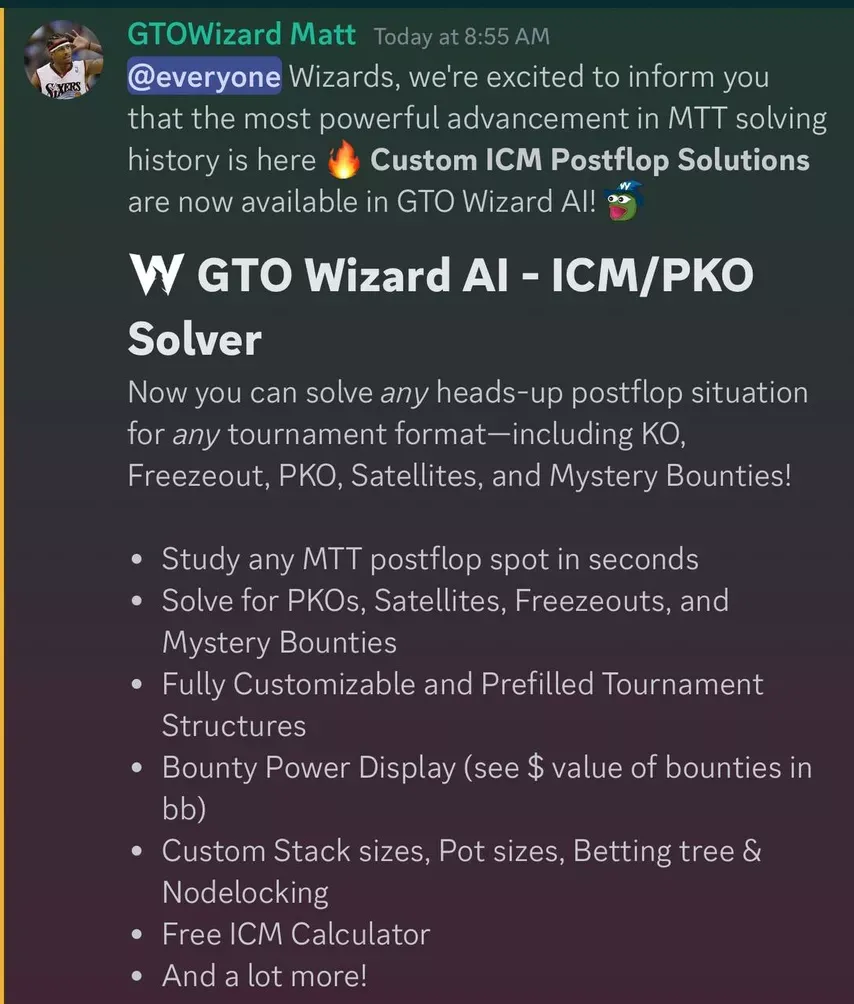
There's been a lot of discussion of how these types of tools are affecting the live realm as well, and that may be the key point where you and I kind of part ways a bit on what our opinions are. But I think when it comes to the online world, we're very much on the same page.
What do you think this particular release does to the potential threat of online RTA, and do you think it's limited to these public tools?
PL: Well, I think the question people ask me when I say anything about the solvers, whatever, they say, "Well, why do you play online if this is the case?" In high stakes, as you kind of just mentioned, it's not really a problem for us because if someone new shows up and plays, and they play this style which is like very, let's say, BTY, we're just going to sniff them out straight away. We're going to use the tools that GTO Wizard has, like the Fair Play Check. We're going to write to the operators and say, "Look, this is the guy, this is what we suspect," and we catch basically everyone.
You're in the group. If anyone shows up at high stakes on any site, really, we will catch them, and you can't really do it against us. So for us, we're very protected, and there's not really that much problem. The problem comes a lot at small and mid-stakes where the player pool is a lot bigger, where it's harder to detect a new player coming in, where people who they're playing against maybe don't know about what Fair Play Check, etc., is.
If they're playing against an amateur or break-even player at, say, NL50 or NL100, that player doesn't even probably know what this whole fair check thing is. He's just kind of getting cheated quietly, I would say.
A lot of these tools which are available now, at high stakes, we've had these tools ourselves. We've spent our lives, careers, kind of dedicating ourselves to being in the lab, you know, like either having custom things built for us or using PIO with a server, whatever else it may be. But it wasn't really a big problem because cheating didn't happen at high stakes because people didn't really have the access for it. Whereas now, the access anywhere from, say, NL10 all the way up to the highest stakes, it's very accessible.
So whenever a new thing comes out, we would usually have already been able to kind of have access to this. So like ICM postflop, for example, you know, Landon spends all day every day kind of on these kinds of things himself. People who play the high stakes, we kind of already had it. It's not like groundbreaking where we're going to learn some magic new strategy. It's just making things, in general, more accessible to low-stakes and mid-stakes.
Where a lot of prominent people in the community, they don't really speak out about it at high stakes because it's not really a problem for us, to be honest. I think if you care about the industry as a whole and want amateurs to be protected, that's when you have to kind of speak up about it. In general, for us, it's not really that big of an issue. So every time there's a new thing released, it just makes the lower and mid-stakes games more cheat-able, or however you want to describe it.
MB: Yeah, I think that's very accurate. I would push back a little bit to say that – and I don't know this for certain, you could probably speak on it a little bit more than me – but throughout the years, there have been plenty of stables and whatnot that had no real qualms about bending or breaking the rules, whether that was colluding together, card sharing, or executing this sort of strategy en masse. Most of these stables are going to be built from the ground up, so they're not just going to be high-stakes guys who are easily caught in a small pool. They're going to be guys that are operating at scale throughout all the stakes.
Now, that doesn't change your point. Your point more so is like, we may see this scale much easier now where it's available to pretty much anybody who's even a lone wolf, as opposed to some select stables that we might be able to police a little bit more closely.
PL: Yeah, I mean, especially low and mid-stakes stables. I've probably staked more than 5,000 people across my career, and you get your EV from people playing many, many tables because the potential ROIs are so high. You're not really trying to eke out an extra one or two big blinds in win rate. Like knowing if I should bet 25% here or should I bet 30% here, should I bet 30% or should I bet 40%, should I bet 67% on the turn or 100% on the turn – stable owners don't really want their players to be so accurate in those regards because the difference in EV is going to be so small, and your EV comes just from adding more tables.
To win money, it's volume plus ROI. At high stakes, the volume is hard to capture because there are only so many tables running. If I want to play a $10,000 tournament on a Sunday, I can play one on GG. Whereas if I stake someone for a $50 tournament, they can play 60 of them in a day, they can play 20 at once.
Stables have never really... It's always been the idea from the industry that "Oh, stables are cheating and doing this and looking at stuff," but that would be the last thing you'd want them to do. You don't want your guy to turn from a 10% player to 11% player. You want him to focus on the volume, which is the tables. Where if you play 10, 20, 15, or even 7 tables, it's tough to be using these kinds of tools. These tools are very effective when you have fewer tables, essentially.
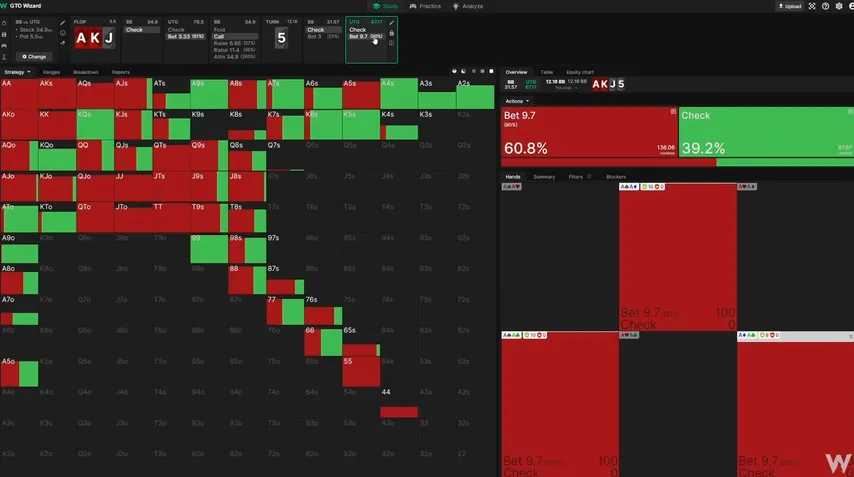
MB: I think that's a really key point to all this. Also, I think one thing to key in on is that the more recent releases of the ICM pre-flop charts or sims, if you want to call them that, coupled with the ICM post-flop, is that MTTs are a lot less detectable when it comes to community vigilance or even whatever each site's operators are looking for. Because MTTs are so dynamic, you're getting so many one-offs and unique experiences.
In cash, like you kind of said, once you start to get stats on somebody and they start to look "botty" so to speak, that's a lot more catchable. People aren't necessarily going to look botty though following ICM outputs. A lot of the most past rhetoric that we've discussed are sites that are infiltrated with bots like Ignition, ACR to some degree, etc., and I think that it was more of a cash problem than anything else because the programming of such was very static. That's what made it very detectable, very catchable.
This does kind of open up a can of worms where now all of a sudden we have to start policing large pools as much as small pools. We kind of talked about this a little bit a couple of days ago, but we basically kind of speculated of like, "Well, what if somebody had the option? What if we just gave somebody a pass and they were free to use their phone mid-hand to kind of go through everything and we put them in the Main Event?" That guy might just win, you know.
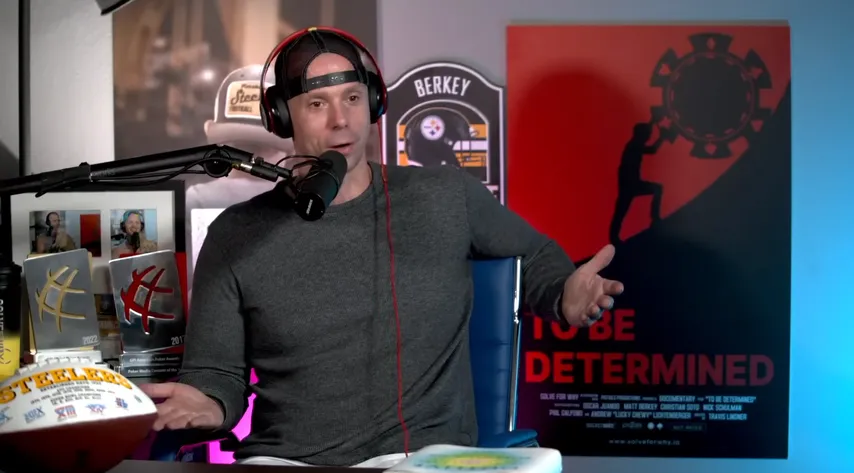
PL: Well, I think again, like these strategies are very defensive a lot of the time. To get the ROIs you want to get in the Main Event, it's a very exploitative kind of style. So I don't think if you had this whole solver or whatever GTO Wizard for the Main Event, you wouldn't be in the top... well, you probably wouldn't be in even like the top 500 players in the field, I would imagine.
Because even the ICM... I think you would, though, late game. The problem is you wouldn't because you're also assuming that people are playing the same kind of strategy. So for example, if the cutoff opened on the button, you would 3-bet really aggressively because the cutoff should play no calls, like only shove and fold. But he's going to end up calling because it's the Main Event and he has a pretty hand and he wants to see a flop and he's tilted and he's on TV and doesn't want to look weak. So basically, he loses EV, you lose EV, and the rest of the table would gain EV.
So there's again, like with all of these solvers and stuff, there's a lot of misconceptions from everybody about this, about almost everything about how they all work, where the EV comes from, etc.
About stables though, I think it does make stables who want to cheat be a lot more effective. So there's this very common idea that there's some stables from certain parts of the world which have like a tier system where once you get to the final x% of the field, you hand over your account to somebody else who then takes over and basically plays the final stages. That's always been the biggest negative about stables and the way that you could cheat the most because I don't want to play a $10 tournament for my guy, but if he gets to the last stages of the Sunday Million, then you know I'm playing now like a $30,000 tournament or whatever.
Now you would need like high-profile players to do this previously, and one, we're not going to do this because it's against our credibility, two we're playing ourselves, three you know like it can ruin a lot of other things. Whereas now I could make a stable and I could just, instead of getting a high-profile player to do this, I could just give someone GTO Wizard ICM and they're using that instead. So it does make it easier for stables who are coming from the ground up, like you said, to cheat a lot easier I think.
MB: Which, you know, which we kind of saw. I think that you're basically just like speaking to the template that Ali Imsirovich was utilizing.
PL: Yeah, I mean it's like more of a South American thing which is on a bigger scale, you know. Once you have like 500 people playing for you, you're going to have somebody playing on a final table every second of the day, you know. So Ali was accused of doing it maybe with like five to 20 guys or whatever, and he was playing himself, whereas if you have a bigger scale, the more effective it would be. I've always stood up and supported stables and said how tough it is to run a stable and make money, but with these tools, it does make it easier to run. I wouldn't even call them a stable, I would just call them like cheating rings or whatever, you know. Like, it's... I think it's unfair to call it a stable almost.
MB: That's fair. You made a point about how much misconception there is in interpreting a lot of these tools. That's a conversation I hope we have time for at the back end of this because it's a drum I've been beating for the last few weeks, and I'd love to hear your take on it.
But I don't want to lose sight of the bigger conversation at hand, which is still what impacts we think these tools have and what are the next steps. Shifting gears a little bit off of the online realm, because I do think that these are a large concern, as are things like card sharing and colluding. I think that online specifically, these are the most difficult things to police and have always plagued that realm. It's just the game has gotten a lot tougher.
So, are you have the impression then that they are being used nefariously as much as or even like to a high enough degree that it's impacting the overall ecosystem?
PL: Yeah, for sure, for sure. I mean, it's very, very easy. I mean, again, I think Matt Hunt said on this podcast to try to make a video showing it. You don't want to see a video of me doing it because it's very easy to do. It's very easy to cheat using these things, which is not really a message we want to send a community like you can cheat using these. But it is like it is very easy to cheat using these and a lot easier than before. Before, if you wanted to cheat, you kind of had your library on like a different PC and it came up that you had like an app open. If you ever had PIO Solver open, your Stars and GG would just like automatically close down. Now it's just on a browser, like it's so much easier to do, you know?
BM: Yeah, I wonder... I wonder to what degree... I only have a little bit of understanding of how the behind-the-scenes work just having spoken to, you know, some of the guys in security like John Andreas, you know, having spoken to the head of GTO Wizard, Matt, and like what the relationships are that he's built with all the major sites. From everything I understand, they do have some sort of influence over the security and the policing of their own product with a lot of these major sites, and I do think that's a kudos more so to GTO Wizard than it is to the operator themselves because they're making themselves available in some sort of capacity.
But with that being said, I do think that one of the reasons why they're available as a consultant is because of the ease of access and how unpoliceable for the most part a browser is. Now, I do think that some of these sites are capable of seeing what's going on on your screen at some... you know, there were rumors that GG was this way, there are rumors that WSOP is this way, like they know what you have running in the background. But even to that end, you can always just have a cold machine where you're running these inputs in real-time. You can do it on your phone. There are definitely ways to get around it. I don't know how easy it is, especially if you're multi-tabling, but I do know that if you're single-tabling, it's certainly a viable option.
PL: Yeah, I mean I would push back a little bit on the whole GTO Wizard collaborating with the sites from a security stance. I heard also that they do this, but I think the biggest proof is how many refunds you receive. I work with Stake, whatever, hundreds of players, and we're not receiving any refunds from GG or Stars because people have been caught using lookup tools or RTA.
If they are working with these sites and they are finding people, because we know people are using them, so if they are finding them and they are confiscating the funds, then where are the funds? Because we're not seeing any of it back. Is it just going to the site or to GTO Wizard? Whereas it's easy to say that we're spending a lot of time on security, but let's see the receipts, you know?
What Are Operators Doing at the Moment?
BM: That brings up my next point, which I think is probably the biggest crux of this discussion: how do we better hold operators' feet to the fire? I too have not heard of any sort of mass refunds, and though I do agree with you that tools pose some sort of threat, we also have a ton of proof that bot rings are in existence, that they've been in existence for quite some period of time. We have an estimate of how much money they've been pulling out of the ecosystem, and there are next to zero refunds being issued.
PL: And we're also the ones who caught them, ourselves. Whatever collaboration there is between the sites and security teams, we caught them and we didn't ask for money from it. This is something you'd pay millions of dollars for, to stop a tens of millions [cheating] operation happening, and we don't ask for money from it. But yeah, there are no refunds happening. So, you know, maybe they are catching people using lookup tools, but it's not really that good for us if we don't know about it.
I think in terms of what the operators can do, I think they should be vocal and show people that they're catching people. It would also deter people from doing it too. Because right now, let's just say I have no morals whatever – then I'm playing WCOOP next month, maybe there's not going to be many more WCOOPs in the future because of this kind of stuff. Maybe I'm like, "Okay, this is the one I'm going to really maximize, milk as much as possible. I don't see anyone else at high stakes being kicked out of the pool, I don't get any refunds, so certainly there's nothing happening in that direction. So let's just go for it this WCOOP and try to steal as much as possible from the community and get out."
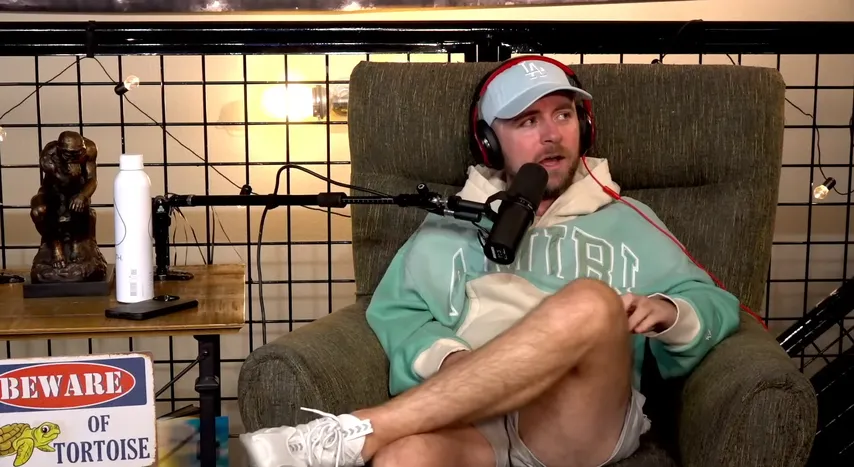
But if I knew that okay, 10 people have been banned in the last six weeks because they've been caught using these tools, then I'd be like, "Oh, wait a minute, I don't want to do that."
So I think the operators and GTO Wizard as a collaboration should be vocal about the people or the amount of people that they close down or the amount of people that they catch. I mean, it's quite easy to show. You don't even have to give names necessarily, you could give numbers, I think.
BM: Yeah, I think offering reports would be a massive improvement. But the bigger point I was trying to mention was kind of zooming out and looking at this at scale. It's like whatever is happening with the lookup tools is certainly there and some amount of money is being taken, but what's even greater than that, that we have proof of, are bot rings. This is lookup tool-adjacent, right? These are people building their own algorithms, and you know, we saw how quickly people were able to build functioning bots and get them on ACR without detection.
So we know that this is happening at a grand scale. We have an estimate of like 10 million that was taken out of the ACR pool and there were literally zero refunds issued.
PL: I think there were refunds.
BM: Yeah, not zero but very small.
PL: I think it was promised that there'd be $10 million refunded, but I think in the end... I don't want to be incorrect here, maybe $200 maximum.
I think the biggest one that I personally heard of was like a couple thousand maybe, and that's not very significant, all things considered.
BM: And I guess like that's the point I'm trying to make. If operators aren't doing right by us when we are vigilant and we catch this major operation taking place, how can we trust moving forward? How do we continue forward down this path of trusting this environment when only more opportunity to cheat is cropping up and less retribution is being offered up to the community?
PL: Yeah, I mean you shouldn't just trust sites without any receipts. There's no reason to trust the site unless they have good things set out, you know, like good guidelines, good proof of what they're doing. If they have like a roadmap of "Okay, we know there's an issue, this is what we're going to do in the short term, the medium term. This is what we're going to do once we catch people, this is how we're going to refund the money, this is our policies, etc." And you know, "We will be transparent and show you."
I think at partypoker, we used to do this. Like we used to show every month how much money we captured from bots and how much was redistributed. And I think it was like millions at the start. I don't want to say the exact numbers, but that was something we did at Party back in the day when there was a big bot problem. Before we came in, there's a security team came in, they're like, "Look, I'm going to try to catch as many people as possible, redistribute the funds to the players, and we're going to tell you in the blog how many people we caught and how much money it was." And of course, they wouldn't have caught everybody, but I think that shows the players that they're caring about it. It shows people who play with bots that okay, they're going to come after you. I think that kind of approach is good.
BM: There's also a conversation that needs to be had... I spoke with a new operator who's trying to get off the ground right now, and one of the first things we discussed was him being adamant that he would not hire bot farms in order to increase traffic. So he was just like blatantly out of the gate saying like this is well within the purview of sites in order to increase traffic, retain traffic, things like this. Like they're basically just botting shills. But the issue is that these bots have win rates, you know. So I think when you look at it from that perspective, the incentives don't really align between the community and these operators, and that's a really scary thing, especially when they're not refunding.
PL: Yeah, for sure. Yeah, I think you should have to trust the site. You have to trust the site, and the trust comes from whether there's the ambassadors there who you trust, the ambassadors speaking up and they're trying to have an influence rather than just wearing a patch. This is... we've been down that hole, we don't need to go there again. But I think that's the sites I choose to put my money into, you know.
I know like Sam Grafton, for example. I know I trust him, I think he's principled, I think he speaks deeply about players' concerns, and I play on PokerStars. It's one of the reasons, you know. Like same with Fintan and Spraggy and Lex. I feel like they have a lot of internal communication, I feel like they are going to the office and speaking to the security teams. I feel like they care, they play themselves, so they kind of are around everything. So I play there more than anywhere else, you know.
BM: I mean, at a bare minimum, their PR is just infinitely better than the vast majority of the other sites that are available.
PL: Yeah. I don't want Lex and Sam Grafton to tell me, "Hey, like we went to here and this is what we're going to do over the next... this is how we catch them, you know, like these are the people doing it." I don't need to know that. I just need to know there's something going on and I trust them. And if something happens, I know they're always there publicly kind of speaking up about it, you know. Like they will be in a Discord group or they'll be on Twitter or they will reply to you, or even call you. Jason Koon used to just call people. Like if people had a problem on GGPoker, I think he would spend 10 hours a day just speaking about people's problems and just being there for you. And when you know he's going to do that, you just feel like, "Okay, I'm going to trust him, you know. I'm gonna... I'm going to do it, you know."
Preventative Measures Poker Rooms Can Take
BM: Factoring online back in, what do you feel are, let's say, like reasonable courses of action that both these tool operators can take as well as online operators and live operators?
PL: Well, if there is such a good collaboration between the solvers and the sites like you suggested earlier, then I think the sites can ask for very reasonable favors. I think if right now you can use a solver on, let's say, the highest volume day like a Sunday, it's very easy to use. The amount of time that you'll have to go into the security to defend all of the games will cost the sites a lot of money – tens and tens of thousands, not hundreds or millions. The amount of people who will use these solvers on, let's say, Sunday in real time to study will be so low. So there's no real reason for their solvers to even be accessible during these times.
It would save the sites a lot of money. It would probably increase the site's revenues a lot because people would play more because they would feel more safe. I, for example, live in Vegas and on Sundays, I don't play on certain sites because I don't feel safe. Like, I'm going to play there if I knew that GTO Wizard wasn't available on Sundays during these times. I would play on all the sites and have a lot more. So they would get all of my rake, and I'm sure lots more people would do the same thing.
So if there is a good collaboration between the sites and the solvers like they suggest, then there's some very easy win-wins such as not having the solvers accessible during World Series online events, during Sundays, or whenever the big traffic is. And the only reason I think to have no delay on a Sunday is because your business model is you want people to use these things to cheat, because the amount of people who use them to study at, say, 4:00 p.m. on a Sunday, it's going to be so minimal. And if you are a partner with the site from a security thing, the way you can solve most of it is just by doing a delay, you know. So like, yeah, if they are partners and if they do work together, then there's no reason there's a delay on a Sunday, you know.
BM: I think that's a really fair compromise.
You know, there is a certain call to action at least from the operator side that should be putting a lot of pressure on these tools to say like, "Hey, let's work together in a meaningful way for the community as a whole." And I understand that a delay will hurt your business model, especially when a bunch of other third parties that don't have to listen to us and aren't pressured by us 'cause they're smaller in the space could just operate with no delay. And to be fair, that wouldn't solve anything, but I do think that like somebody as large as GTO Wizard that has so much influence over the space, if they were to implement this compromise where it's like, "Okay, on Sundays we're going to execute a delay," I think that it at least sets the proper precedent moving forward in some sort of capacity, where we start to hold all these companies to a bit of a higher standard.
My biggest concern though is that it still wouldn't ultimately solve the issue. The issue has to be solved at the operator side.
PL: Yeah, I mean, if also a site kind of said, "We're not going to accept any customers who have GTO Wizard accounts," you know, like, "We think it's just too much. There's too much there. We think for a fun and fair site, anyone who's a GTO Wizard subscriber, we're just not interested in having you as a customer. And it is going to be hard to catch you, but we will catch some of you. When we do, we're going to confiscate the funds and whatever. If you sign up and play on our site, you're signing to say you don't use this site because we believe they're acting in ways where it makes the game state unsafe, so we have to fight against it."
So I think there are ways where they can go in those directions too. And then GTO Wizard says, "Look, on Sundays, we're going to have the delay." Then it shows the goodwill because if I was GTO Wizard, I wouldn't have a delay. Why? All the sites partner with you, you can be sponsored everywhere, and there's no real pushback. Like, sure, maybe I tweet or something, but that's about it, you know?
I think unless a site does something like really big like that, and you know, of course they're going to get a lot of people who just don't play, but they'll also get a lot of people who will play. And a lot of people who will play will be, you know, amateurs and people who want a fair kind of place to play, and they'll just see a site who's at least trying to do something, you know.
And again, I'm not saying to go that extreme. I'm just saying there is a way.
BM: We did an episode last week where a random podcast from Australia that is AI-based, they built a bot through ChatGPT that fed them perfect strategy, and they were just like outwardly executing 'cause they don't know anything about terms of service. And they thought it was like this fun little game where they were able to win hundreds of dollars playing like 100NL on Ignition. And to my knowledge, nothing happened. So it's like, when it seems like a blatant non-concern from operators, I think we have a right to be very up in arms as a community.
And I guess that was the other point of like why I'm pro tools, because I do think that it brings this conversation to the forefront. 10 years ago, we didn't have any idea that this stuff was available, right? Like whatever was happening privately, we had no notion of whatsoever, and we just assumed sites were handling it. Games are also much softer back then, so if we were being cheated, we kind of just accepted it as the cost of doing business, and we were going to win anyway.
Edges are getting razor-thin, and if these operators have any concern whatsoever over retention and keeping the games healthy and their ecosystem alive, and having online not be this dying star that we're witnessing extinguish in front of our eyes, they have to figure out a way to get this under wraps, I would think.
PL: For sure. I mean, I play in a lot of private games, a lot of private cash games, and almost every player I play against tells me they wouldn't dare play online. Like some of my best friends, the reason why I got into poker, they work in poker companies, and they are very interested in the industry, but they would never play a single hand online. And these are people who are working in the industry, you know? Like they just realize it's completely messed up.
So I think this... the number of people who are going to be driven away because of the solvers and lookup tools is going to get higher and higher. Every time there's a new scandal, like I imagine... is it Tomayo, Tamayo?
BM: Tomayo, tomato, yeah.
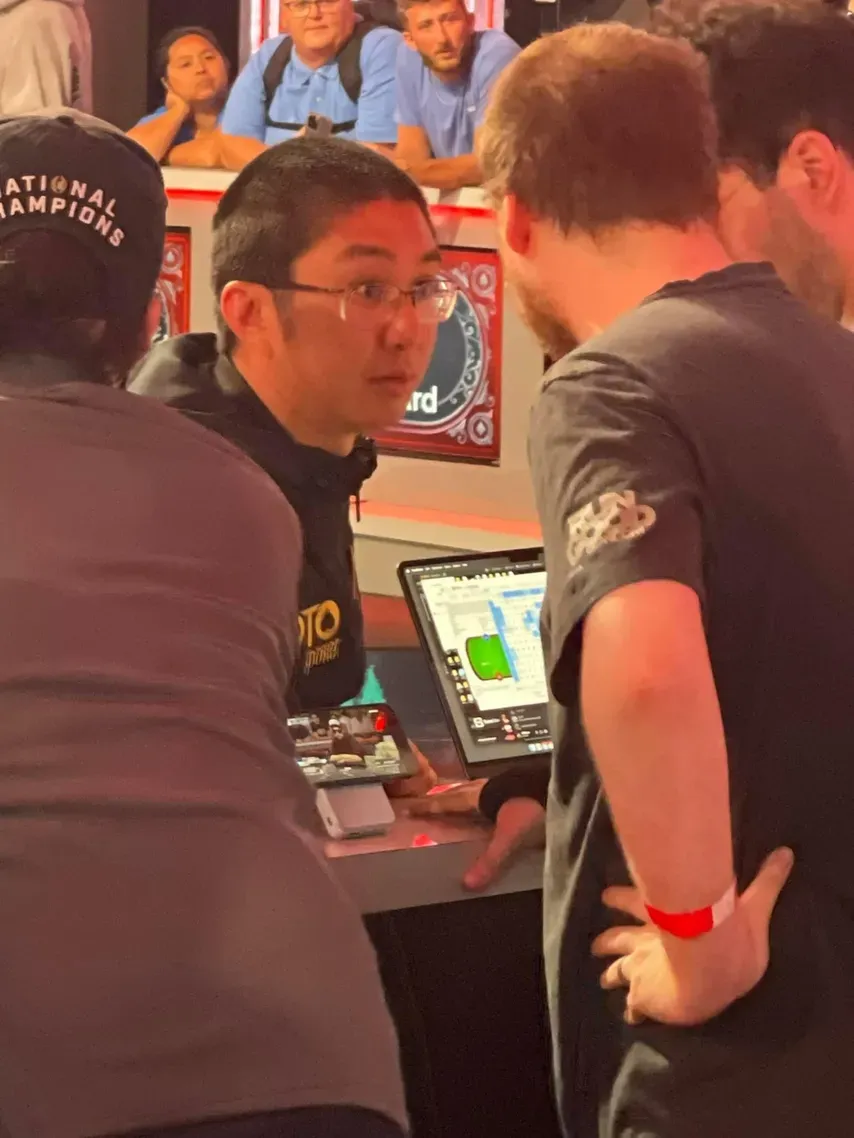
PL: I'm sure like these kinds of things are just going to drive, you know, like maybe 100 people away, maybe 200 people away. Maybe it drives 10 people away from the Main Event next year. Whatever it is, whenever these things happen, it doesn't drive people to the game, it drives them away from the game. And if we take the next 10 years, just more thousands and thousands of people will be driven away. As I'm sure the Ali scandal drove a lot of people away from playing online, and I think same with the Fedor Kruse. And again, these are people who got caught just very, very stupidly. Like, a lot of people just aren't going to get caught, you know? Like it's very... for the... yeah, like if I'm living in Eastern Europe, I'm not going to get caught, you know? The people who are going to find out are not going to be people who know you, who as a podcast... it's going to be people in my small community or whatever, you know?
Yeah, Fedor Kruse lived with like six of the guys who were playing or whatever in the same stakes or whatever, the same... they kind of had to speak out, right? It's like... it's very different if you're smart about it. It's very, very different.
























